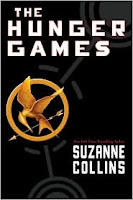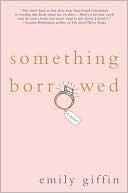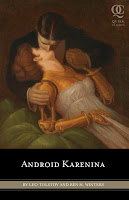
The Book: Something Like Fate
The Author: Susane Colasanti
How I Found It: I'd gotten curious about Colasanti's YA romances after finding them on a search for good YA literature, and when I came across this one recently, I was intrigued because it almost sounded like Something Borrowed (see below) for a young adult audience.
The Review: This was my break after reading two dystopian novels in a row. Never again! I'm glad I gave Colasanti a shot; her books sounded interesting and after reading this one I'd be open to trying more by her. I'd seen reviews comparing her to my favorite YA author, the amazing Sarah Dessen, and while she doesn't have quite the same amount of skill as Dessen does at crafting a plot with an unusual twist on an interesting theme, Colasanti's work has more depth and meaning than other YA novels I've seen.
Lani and Erin are best friends, bonded forever by an accident when they were young that nearly took both their lives. Both of them share an obsession with the same idea: fate. Horoscopes, palmistry, all of it appeals to them--especially to Lani, who hates the "Unknown" and the idea of taking risks. Erin is her best friend besides Blake, who is in the closet due to fear of his homophobic father, something only Lani knows. It is the end of junior year and summer is almost upon them.
Erin begins dating Jason, a nice guy who is every girl's dream--and quickly becomes Lani's, once it becomes clear how deep of a connection they have. They have so many things in common that this has to be fate. But why would fate steer Lani to her best friend's boyfriend when he's the one guy she can't have? Why does Erin have to leave for camp, leaving Lani with Jason for the whole summer? What does it mean to betray the best friend who has always been there for you?
To start with, the book deals with some interesting and important issues in a nice, readable way, and I'd even recommend this to parents of younger teens who might want to know about bullying or cruelty in high school. The latter half of the book explores issues such as cruelty between girls and homophobia, and depicts them honestly. If a starting point is needed to discuss these issues, as well as feelings of guilt or betrayal in a friendship, this would be a great one. Lani's pain is realistic and relatable, as is Blake's need for acceptance from those around him, though that is more of a subplot. There is nothing that could be objectionable to younger teens; there is merely some kissing and no swearing or anything of that sort. I was almost surprised by how entirely Colasanti avoided sex and language; judging by how well her books sell compared to other authors in the genre, it's very impressive.
While the book was definitely readable and interesting, I did have some issues with Lani's narrative voice. Though I stopped noticing it after a while, I was slightly annoyed when phrases like "legit", "and I was like", etc. popped up in the narration. The voice was accurate to that of today's teenager, but almost to a fault. It bothered me mainly because I prefer grammatical accuracy rather than colloquialisms in narration, but I doubt it will be bothersome to anyone else; it certainly shouldn't be a deterrent.
That being said, some other things about the story intrigued me. Colasanti delves into the issue of fate mostly in a surface-level way; the actual methods fade in importance as the book goes on, to be replaced by the general idea of fate and the "Energy". One thing that stuck out was although Lani and Erin express interest in Taoism and Buddhism in their fate studies at the book's start, there are no other mentions of religion. Colasanti does not equate the belief in fate to a belief in God, which was PC but an interesting perspective. I also liked that Colasanti hinted that perhaps Lani was simply interpreting her horoscopes, etc. the way she wanted to and using them as an excuse to do or not do things, until she gradually comes to realize she can control her own fate. The astrology or the idea of fate is not pushed on the reader as something we have to believe in to enjoy the story; it is merely a device, and an interesting one.
Overall, this was a perfectly enjoyable YA romance, and I recommend it to teens of any age or parents that might want to give a book without objectionable material to their kids that could nonetheless open up interesting discussions.



